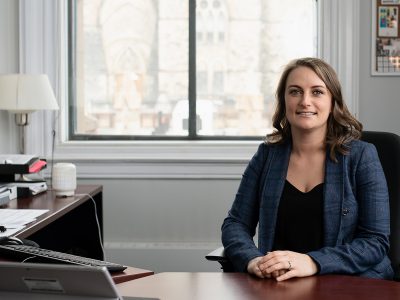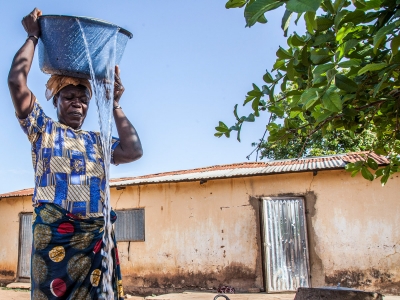By Dan Rubinstein
Photos by Chris Roussakis
Dana Brown, the new dean of Carleton University’s Sprott School of Business, did not follow a traditional trajectory from the United States and United Kingdom to her first job in Canada.
Her most recent academic positions in the UK may have been dean of the Faculty of Business and Law at De Montfort University and director of the MBA program at the University of Oxford’s Saïd Business School, and she may have been one of the first few dozen employees at Amazon in Seattle in the mid-1990s, tasked with creating a new inventory system for the fledgling Internet giant. But her graduate school experience — a master’s degree in Russian and Eastern European Studies at Oxford followed by a PhD in Political Science at the Massachusetts Institute of Technology — aren’t the typical launch pad for the head of a business school.
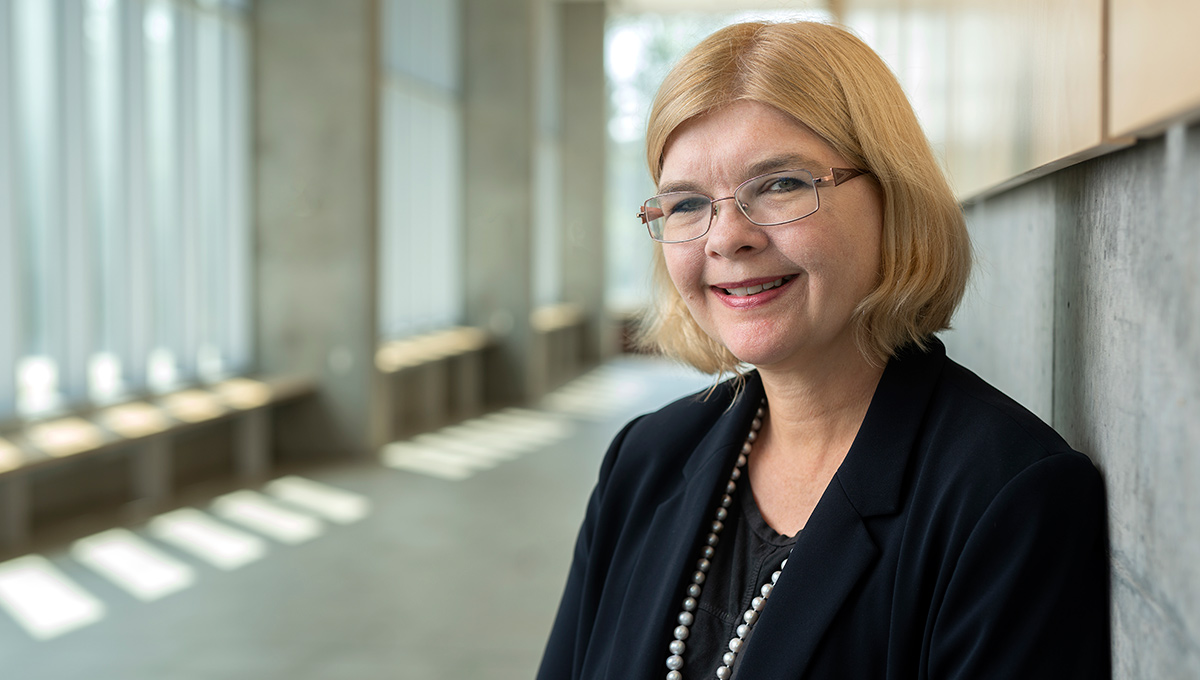
Dana Brown, Dean of the Sprott School of Business
Which helps explain why Brown, who began her five-year term at Carleton on July 1, has bold views about how people produce, buy and sell products. And why she believes that a new approach to business education will help students and graduates make constructive contributions to our rapidly changing world.
“For most of their history, business schools have perpetuated the idea that profit comes from some form of exploitation — of people, the environment, lax regulations and so forth,” says Brown, who also spent three years working at the EMLyon Business School in Lyon, France.
“This is no longer acceptable in the world today and it is not what this generation wants to learn. Business must serve the needs of people and communities and create a positive impact. By developing services and products that address real needs, businesses will profit.
“This may sound a bit radical, but the foundation for my ideas comes from a long history of working at business schools and seeing what we can achieve,” she adds, explaining that conversations about a transformation of business practices began to accelerate in 2008 during the onset of the global financial crisis
“What people really want out of their lives is to make a difference. If we can harness that power, we can help people make a difference. I think that Sprott is already on that road, integrating responsible business practices into the curriculum, and I believe that our faculty, students and community partners can be pioneers.”
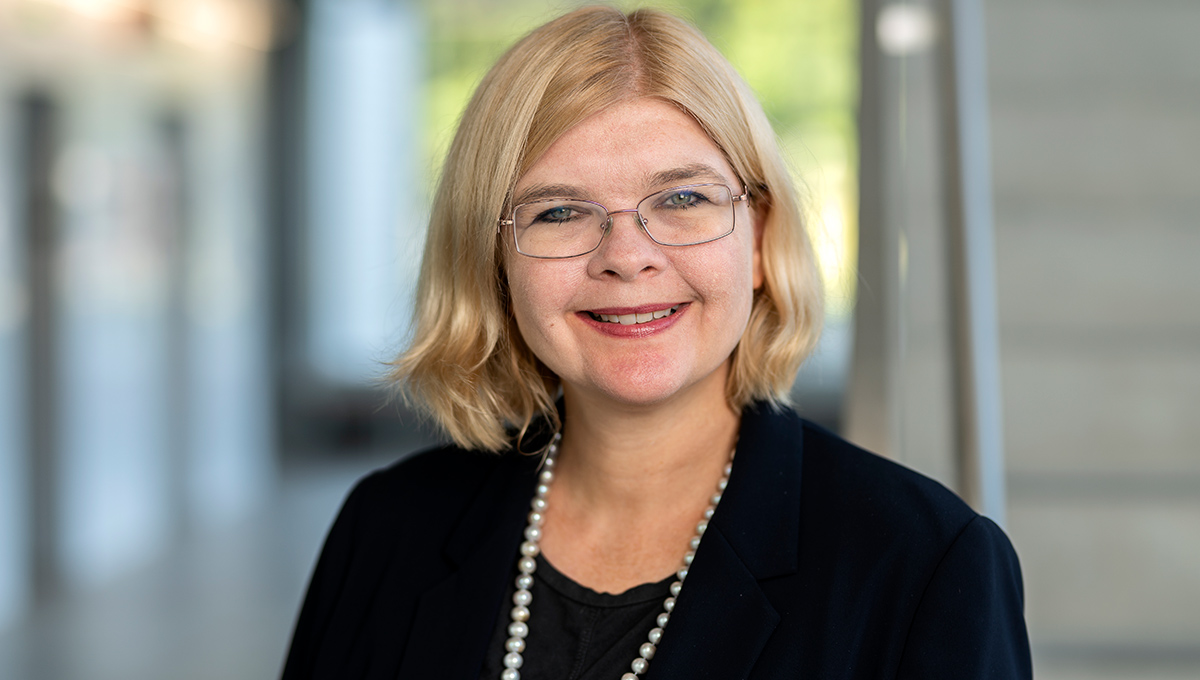
A Life-Altering Decision
For Brown, choosing to come to Carleton was a major life-altering decision.
She uprooted her family — husband, three daughters, two cats, one dog — for a trans-Atlantic move from Leicester to Ottawa, an unfamiliar city in an unfamiliar country.
But there are enough commonalities between Canada, the UK (where she had worked for nearly 15 years) and the U.S. (where she was born and raised and attended Rutgers University as an undergraduate) that Brown felt comfortable with — and excited by — the challenge of adjusting to a new academic landscape.
“It’s an educational context that I know very well,” she says, “and I was looking for an opportunity to bring to fruition some of the ideas that I have. I was looking for a place where these ideas were already resonating.”
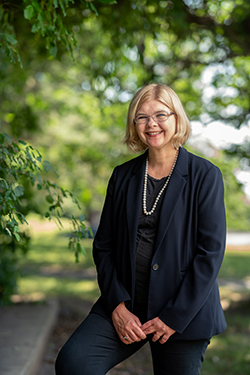 Carleton wants to be a disruptor and have a broad social impact, says Brown, noting that the university’s strong sense of community — as evidenced by the warm welcome she has received over the past months — provides the footing an institution needs to be a force for change.
Carleton wants to be a disruptor and have a broad social impact, says Brown, noting that the university’s strong sense of community — as evidenced by the warm welcome she has received over the past months — provides the footing an institution needs to be a force for change.
Moreover, some of the pressing issues influencing higher education in the UK, such as a recalibration of the relationship with governments around funding, a shift in how knowledge is generated and shared amid the rise in new communication technologies, and questions about how university values mesh with societal goals, are also at play in Canada.
“There is a need for change, and I think that Carleton is a place where we can do it because we have the will and the skill,” she says.
“Universities have a vital role to play in addressing the big societal challenges that we face in the world today. Addressing these challenges requires new ideas and the ability to bring together technical, cultural and social insights to problem-solving.
“This is what universities do well, and business schools have an important role to play within universities to accelerate their role as agents of social change. We bring insights into how to turn ideas into sustainable ventures, how to lead and manage change, and ways of connecting to the world.”

It Takes Vision to Make a Change in the World
Brown was born in New Jersey, across the Delaware River from Philadelphia, and raised by a single mother, a telecommunications worker and artist, and her grandparents. Her British father, an engineer, came into the picture in her late teens.
She worked starting at around age 10, babysitting, raking leaves, shovelling snow, delivering papers and moving into a sales and management role at a new retail venture by high school. Going to college was always her goal, although it was not an experience that she knew much about. With encouragement from her employers and good scores in math, she chose engineering as a major at Rutgers.
But Brown also loved trying to understand people and their motivations. It was 1989 — the Berlin Wall was coming down, Mikhail Gorbachev was on the TV news every night talking about glasnost — and she got swept up in the excitement, switching her major to political science and spending a year abroad in Russia.
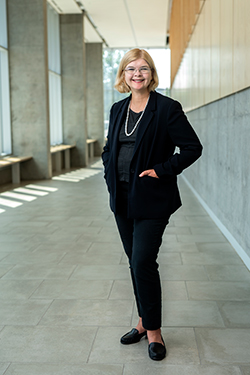 That propelled her to Oxford for her master’s degree on a Rhodes Scholarship, an experience that provided international perspective and a heightened sense of empathy, both important qualities in the face of contemporary political trends that she finds troubling.
That propelled her to Oxford for her master’s degree on a Rhodes Scholarship, an experience that provided international perspective and a heightened sense of empathy, both important qualities in the face of contemporary political trends that she finds troubling.
Before beginning her PhD, Brown directed a digital learning centre at Rutgers and worked for a pair of American companies, including Amazon, which had just 30 employees when she was there. Her job was to source books from suppliers for online customers, a sales business that boomed from about 10 books per month to 10,000 books in just a handful of weeks.
“At the time, nobody believed that anybody would buy anything on the Internet,” says Brown, who travelled throughout the U.S. to look at different supply chain systems.
“The lesson I took from Amazon is that it takes vision to make a change in the world, and that the most exciting time to join any organization is during a period of change or growth.”
She also realized that real-world business experience is important for academics who teach or conduct research in the field.
“Business is a practice, an attitude, a set of behaviours,” says Brown, who has always been torn between working in academia and the private sector, noting that a dean’s job — with its focus on leadership, management and finances — is an amalgam of the two.
“It’s important for faculty and students have first-hand experiences in business, and it’s important to break down barriers between academic institutions and the communities they serve,” she says. “To have this role, universities have to change their organizational practices. We can no longer be isolated from communities; we must be integral to them. This means taking a more proactive approach to collaboration in research and teaching, and opening our doors to co-create.”
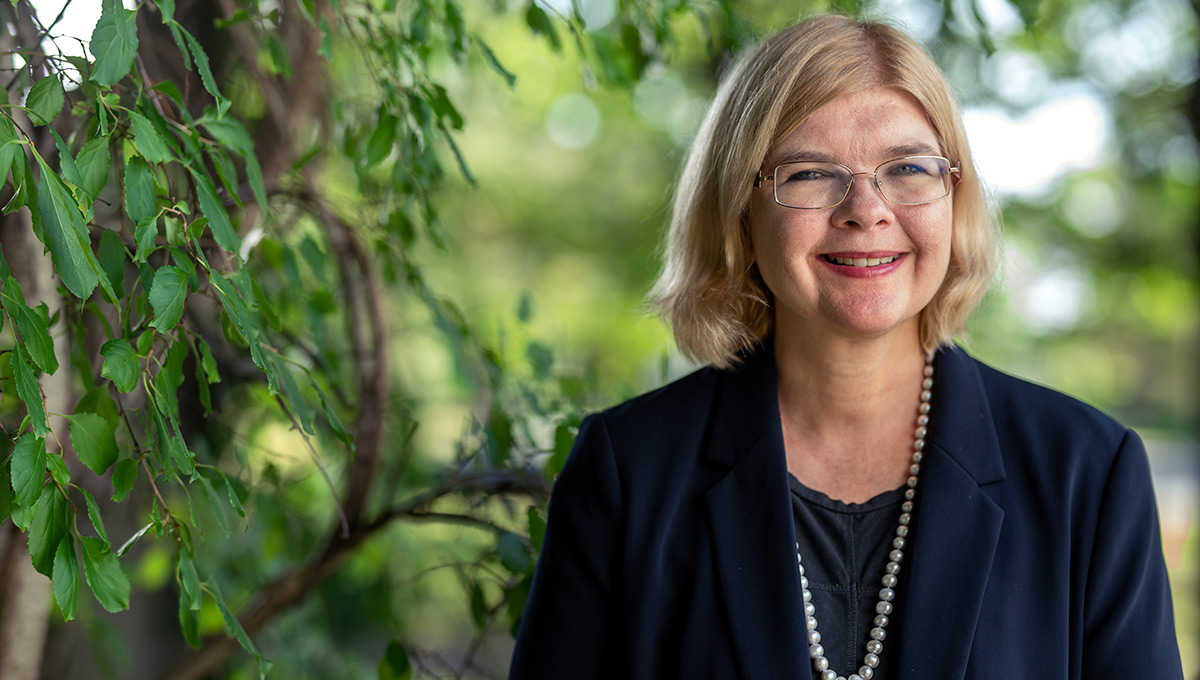
Bringing Sprott’s Teaching, Research and Collaboration Spaces Together
Sprott’s future home, the Nicol Building, will help connect Carleton’s business school to local, national and international communities.
Because it will be centrally located steps from the O-Train stop and at the tunnel junction linking the university’s academic campus, residences and Athletics, the 115,000-square-foot, six-storey building will serve as a new gateway to Carleton.
When the building is completed next year, all of Sprott’s teaching, research and collaboration spaces will be together under one roof for the first time, fostering the type of serendipitous encounters between colleagues and students that can spark creative ideas. And though blueprints for the exterior and many features (such as a signature three-storey atrium) are final, Brown will be able to help shape the interior to create a welcoming and dynamic environment.
“The Nicol Building provides an opportunity to strengthen our connections to others in the university and to the community, and to open our doors to the world,” she says, explaining that in her travels to business schools around the globe, anachronistic architecture (i.e., stark and austere spaces designed for men who wear dark suits) tends to prevail.
“With lighter colours and open spaces for networking and collaboration, we aim to make the building look and feel like a 21st century business school should.”

That attitude extends to how Brown views inclusiveness more broadly, and how business and business schools have traditionally excluded diverse people and voices.
“To understand diverse groups of people and their needs, we need to be open to a wide spectrum of voices and to seek out local engagement,” she says. “And not just token diversity — I mean ensuring that everyone has a say.
“A key component of purposeful business is inclusiveness and breaking down barriers between communities,” continues Brown. “Businesses need to harness inclusive economies by widening the accessibility and affordability of key products and services. Greater, more equal participation in the economy should be the type of growth we seek to achieve.
“To foster ideas along these lines, we must be an inclusive community ourselves. This means not only fostering diversity but also looking at new ways to ensure that everyone has a voice and is engaged.”
Brown’s thoughts about inclusiveness have been informed by her work in India, where she sits on the governing council of New Delhi’s Vedica Scholars Programme for Women, which helps women from a wide range of backgrounds develop business leadership skills. She also works with a Thailand non-profit called Warm Heart Worldwide, founded by a political science professor at Rutgers and focused on local economic development in the hills of the Phrao district through education, sustainable farming and microeconomic enterprises that help people stay and work in their communities.
In this part of Thailand, huge swathes of land were given away to large corporations, which means that young people typically have had to leave to look for jobs.
“What kind of system is that and who is it for?” asks Brown.
“This is a perfect example of what went wrong with globalization — and this project is an example of what we can do to change things.”
Even though it’s thousands of kilometres away from Carleton, it also embodies the shift that’s underway at Sprott, and how a new approach to business education can make a meaningful and tangible difference.
“The status quo is hard to change,” says Brown, “but that doesn’t mean we need to be afraid of change.”
Monday, October 7, 2019 in Sprott School of Business
Share: Twitter, Facebook
